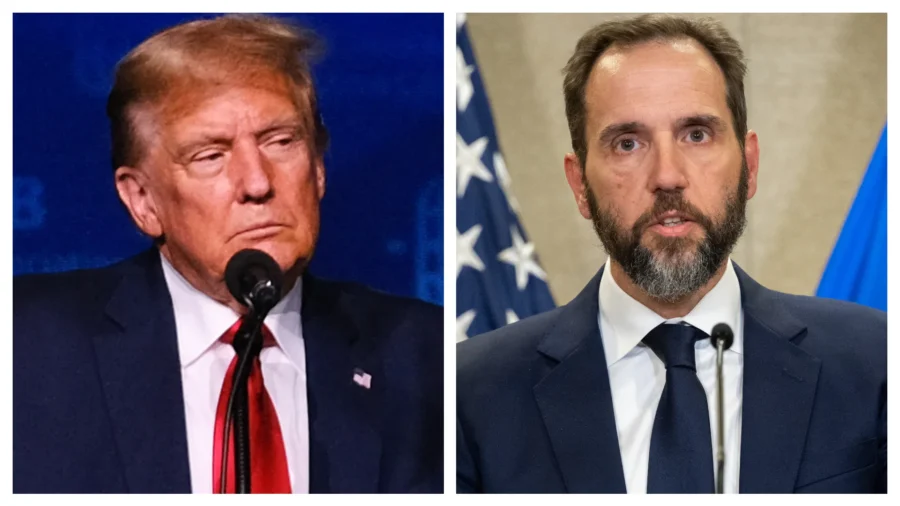Lawyers for former President Donald Trump argued in his classified documents case that special prosecutor Jack Smith has been given too many resources while other parts of the Department of Justice haven’t.
The former president faces dozens of charges that he allegedly illegally retained classified materials after he left office in 2021. He has pleaded not guilty to the charges and has sought to delay the trial, while U.S. District Judge Aileen Cannon has not set a firm date for when it will start.
His attorneys earlier this week argued that Mr. Smith’s team was handed “a blank check” that has imperiled the former president’s rights.
“To be clear, offering the Special Counsel a blank check has harmed President Trump’s substantial rights, and DOJ [Department of Justice] simply could not have funded the entirety of Jack Smith’s expansive politically motivated witch hunt from an alternative source,” Trump attorney Christopher Kise wrote in court to Judge Cannon earlier this week, adding: “Since the founding, resource constraints on prosecutors have been regarded as an indispensable guarantee of substantive fairness.”
Because there are no constraints, the lawyer wrote that the special counsel’s office can “engage in an unabashed political crusade with zero accountability” against President Trump. Mr. Smith was appointed by U.S. Attorney General Merrick Garland in 2022 to pursue the classified documents case and the federal election case in Washington.
“The Special Counsel’s Office is pursuing two different cases in two jurisdictions in order to maximize interference in the ongoing presidential election,” Mr. Kise wrote. “This tactic is the luxury of a prosecutor facing no resource constraints. And it is far from a forgone conclusion.”
The special prosecutor’s team has yet to file a response to the court motion.
Later in the motion, Mr. Kise wrote that other parts of the DOJ have been denied funding, including targeting Big Tech antitrust cases. “In 2019, for example, DOJ was forced to prioritize its antitrust review of Google over Apple because it could not afford to pursue both,” he wrote.
Earlier, his attorneys and third parties have argued that Mr. Smith’s appointment by the U.S. attorney general violated the Constitution’s Appropriations Clause, noting that Congress has to approve his team’s expenditures.
Last week, a law professor submitted a “friend of the court,” or amicus, brief in the case, arguing that Mr. Smith is not an “officer of the United States” due to how he was appointed.
“Simply being appointed by a department head does not elevate that position to the status of an inferior ‘Officer of the United States.’ Indeed, the mere fact that a person is appointed by the Head of a Department does not make that position an office at all,” Professor Josh Blackman of the South Texas College of Law in Houston wrote, referring to a brief that Mr. Smith had filed in which he described himself as an “inferior officer.” “Instead, precedents … provide that an office must be continuous.”
“Mr. Smith’s actions as a notionally independent United States attorney are beyond the scope of what the Supreme Court has permitted, and therefore, his actions are unlawful,” he also wrote.
Separately, the special counsel has responded to claims that he was improperly appointed by Mr. Garland or that his office is illegitimate. Responding to another brief that was filed, Mr. Smith wrote such claims lacked merit and that “every court that has considered them has rejected them, including authoritative decisions by the Supreme Court.”
“Resolving the validity of the Special Counsel’s appointment would not lead to an accelerated appellate proceeding if Trump’s claim failed,” he wrote earlier this month. “Unlike with a non-frivolous immunity claim, Trump would have no right to an interlocutory appeal should the Court deny his Appointments Clause challenge.”
Other Activity
Defense lawyers have filed about a half-dozen motions to dismiss the case, with Judge Cannon this month hearing hours of arguments on two of the dismissal motions, including whether President Trump was entitled under a statute known as the Presidential Records Act to retain the classified documents after he left office and whether the Espionage Act law at the heart of the case was so vague as to be unconstitutional.
The judge appeared skeptical of the defense assertions and, after the hearing, issued a terse two-page order rejecting the vagueness argument while permitting the former president to raise it again later.
She has not yet acted on the Presidential Records Act motion, but last week she issued a direction to lawyers for both sides to weigh in on proposed jury instructions that appeared to tilt in Trump’s favor.
She asked them to respond to a premise that said in part: “A president has sole authority under the PRA to categorize records as personal or presidential during his/her presidency. Neither a court nor a jury is permitted to make or review such a categorization decision.”
The Associated Press contributed to this report.
From The Epoch Times


